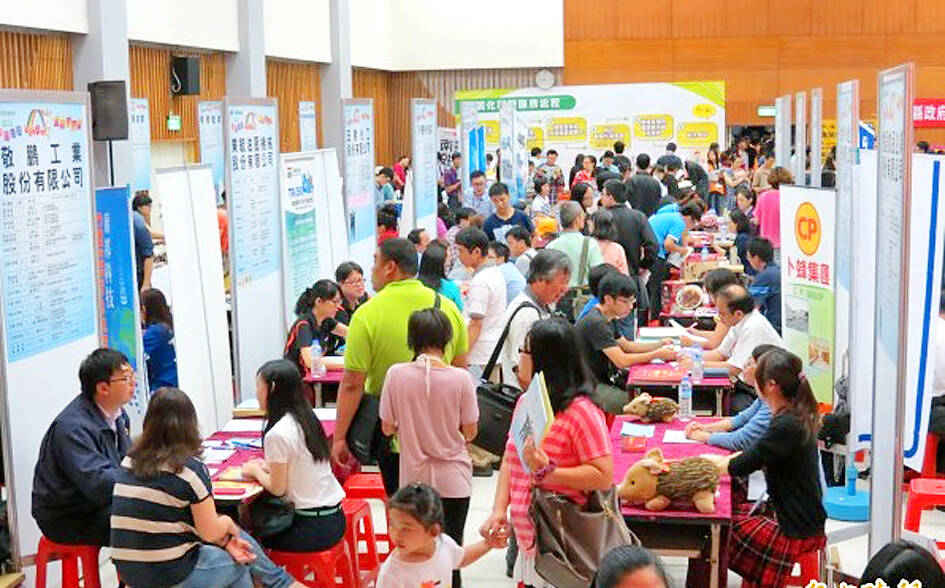The number of workers hired by industrial and service sector firms in November increased 0.1 percent to 8.19 million, as hospitality companies added 2,000 employees, more than offsetting a drop of 1,000 workers at local manufacturers, the Directorate-General of Budget, Accounting and Statistics (DGBAS) said yesterday.
The imbalance is likely to continue, as service-sector firms increase hiring to meet demand driven by eased COVID-19 restrictions, the agency said.
Compared with a year earlier, overall payroll expanded 0.35 percent, or by about 28,000 jobs, as more people went out to eat, DGBAS Census Department Deputy Director Chen Hui-hsin (陳惠欣) said.

Photo courtesy of the Kaohsiung Labor Affairs Bureau
She attributed the retreat in hiring activity by local manufacturers to global inflation and monetary tightening, which is cooling demand for electronics, the main driver of Taiwan’s exports.
Major tech and non-tech firms are cutting capacity to cope with weak demand and inventory adjustments, which would explain a 2.7-hour decrease in overtime hours from a year earlier to 13.5 hours, the fifth straight month of decline, the latest DGBAS report showed.
By contrast, service providers focused on the domestic market have staged a quick and solid comeback, as companies throw year-end banquets for their employees after a three-year hiatus due to the COVID-19 pandemic, Chen said.
The business pickup is most evident at restaurants, hotels, travel agencies and entertainment facilities, she said.
The high season might extend through the Lunar New Year holiday and the school winter break at the end of next month, she added.
The accession rate — the number of new employees added to payrolls — shed 0.1 percentage points to 2.09 percent, while the exit rate weakened 0.16 percentage points to 1.99 percent, which is positive for labor participation gauges, the DGBAS said.
Also for November, average monthly take-home pay averaged NT$44,682, rising 2.35 percent from a year earlier, the agency said.
Total monthly wages — including overtime compensation, performance-based commissions and bonuses — rose 1.99 percent to NT$51,157, it said.
Workers at financial and insurance companies had relatively high regular wages of NT$64,269 a month, followed by electronics manufacturers at NT$52,382 and overall manufacturers at NT$42,430, it said.
Restaurants and hotels offered relatively low monthly take-home pay of NT$33,499, lower than other service providers, which averaged at NT$34,151, the agency said.
The Ministry of Labor has said that hospitality companies should raise wages to expand their labor pool. Hotels have pressed for regulatory easing so they can hire cheap workers from abroad.

Merida Industry Co (美利達) has seen signs of recovery in the US and European markets this year, as customers are gradually depleting their inventories, the bicycle maker told shareholders yesterday. Given robust growth in new orders at its Taiwanese factory, coupled with its subsidiaries’ improving performance, Merida said it remains confident about the bicycle market’s prospects and expects steady growth in its core business this year. CAUTION ON CHINA However, the company must handle the Chinese market with great caution, as sales of road bikes there have declined significantly, affecting its revenue and profitability, Merida said in a statement, adding that it would

i Gasoline and diesel prices at fuel stations are this week to rise NT$0.1 per liter, as tensions in the Middle East pushed crude oil prices higher last week, CPC Corp, Taiwan (台灣中油) and Formosa Petrochemical Corp (台塑石化) said yesterday. International crude oil prices last week rose for the third consecutive week due to an escalating conflict between Israel and Iran, as the market is concerned that the situation in the Middle East might affect crude oil supply, CPC and Formosa said in separate statements. Front-month Brent crude oil futures — the international oil benchmark — rose 3.75 percent to settle at US$77.01

RISING: Strong exports, and life insurance companies’ efforts to manage currency risks indicates the NT dollar would eventually pass the 29 level, an expert said The New Taiwan dollar yesterday rallied to its strongest in three years amid inflows to the nation’s stock market and broad-based weakness in the US dollar. Exporter sales of the US currency and a repatriation of funds from local asset managers also played a role, said two traders, who asked not to be identified as they were not authorized to speak publicly. State-owned banks were seen buying the greenback yesterday, but only at a moderate scale, the traders said. The local currency gained 0.77 percent, outperforming almost all of its Asian peers, to close at NT$29.165 per US dollar in Taipei trading yesterday. The

RECORD LOW: Global firms’ increased inventories, tariff disputes not yet impacting Taiwan and new graduates not yet entering the market contributed to the decrease Taiwan’s unemployment rate last month dropped to 3.3 percent, the lowest for the month in 25 years, as strong exports and resilient domestic demand boosted hiring across various sectors, the Directorate-General of Budget, Accounting and Statistics (DGBAS) said yesterday. After seasonal adjustments, the jobless rate eased to 3.34 percent, the best performance in 24 years, suggesting a stable labor market, although a mild increase is expected with the graduation season from this month through August, the statistics agency said. “Potential shocks from tariff disputes between the US and China have yet to affect Taiwan’s job market,” Census Department Deputy Director Tan Wen-ling